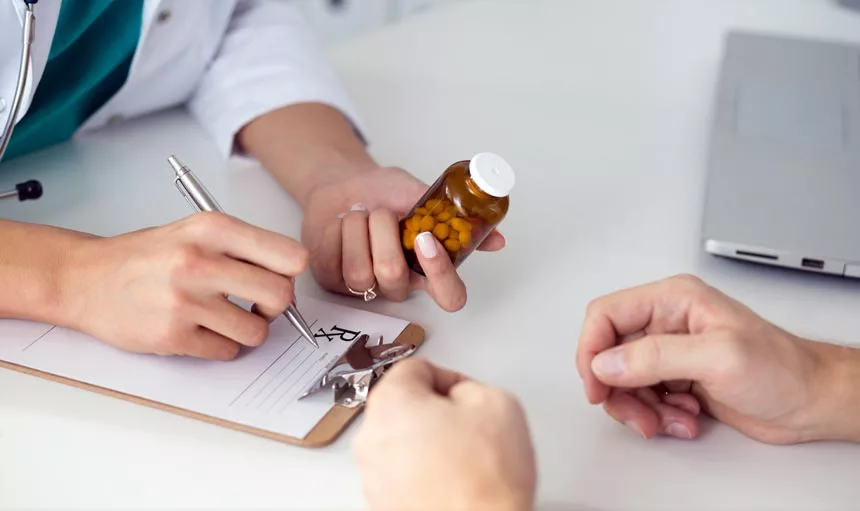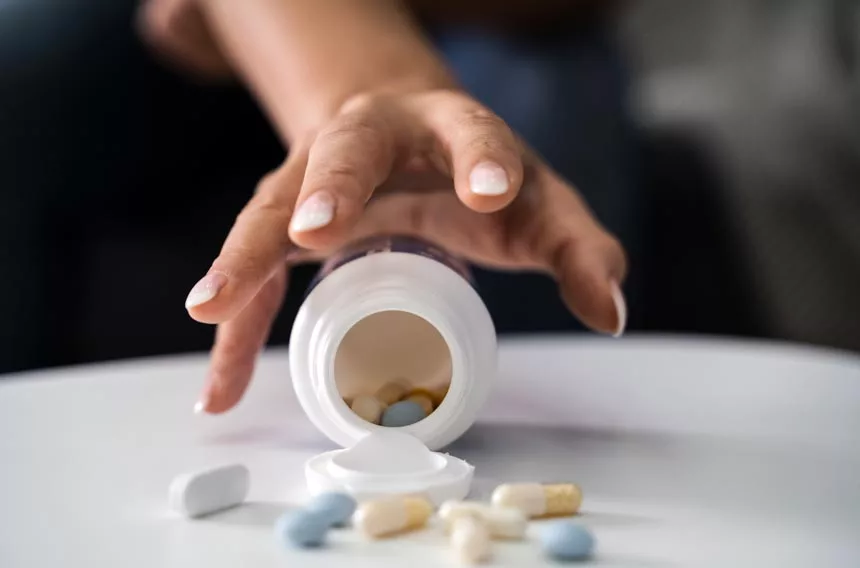What are Opiates?
Table of Contents
- What are Opiates?
- The Difference Between Opiates and Opioids
- Understanding Opiate and Opioid Addiction
- How Does Someone Become Addicted to Opiates?
- Understanding the Dangers of Opiate and Opioid Withdrawal
- The Signs and Symptoms of Opiate and Opioid Withdrawal
- The Right Kind of Treatment for Opiate Withdrawal
- Medical Detox for Managing Opiate and Opioid Withdrawal Symptoms
- Find Opioid Withdrawal Treatment Options Now
- Medically Reviewed By
Opiates refer to both natural and synthetic drugs that are usually prescribed to treat chronic or severe pain. These include morphine, oxycodone, codeine, hydrocodone, and other opioids. Opiates are derived from the seeds of the opium poppy plant, and opiate withdrawal occurs following dependence.
These forms of narcotics are especially effective when used to treat pain for people with health conditions that may cause chronic moderately severe pain, and may even be used to help manage various digestive issues.
With that being said, however, these substances can also be very dangerous for a person’s health, as they pose a high risk for drug addiction. Compared to recreational drugs such as marijuana, there is a far more significant chance of drug dependence when using opiates.
Currently, the Drug Enforcement Administration (DEA) classifies natural opiates as Schedule II substances, meaning that, while they have a recognized clinical usage, they also have a high potential for addiction.
Unlike the prescription forms of opioids and opiates, other opioids which are illegally produced, such as fentanyl and heroin, have a Schedule I classification, due to their lack of medical use. These also often present a higher risk of substance abuse, as they are much more potent.
Keep reading to find out more about opiate withdrawals and how to combat them effectively!
The Difference Between Opiates and Opioids
While the terms opiates and opioids are often used interchangeably, there is a difference between these two drug terms. The term opioids are broader, referring to a class of drugs that are capable of interacting with opioid receptors in your brain and body.
Naturally-produced drugs under this classification are referred to as opiates, while other opioids are made with synthetic chemicals in laboratories, usually without any regulation or safety standards. There are four different opiates, which include:
While opium and heroin are both considered illegal drugs, morphine and codeine are still used in modern medicine today. However, these medications are heavily regulated when administered to patients and are rarely prescribed by a doctor without absolute necessity.
Understanding Opiate and Opioid Addiction
The scariest thing about opiate addiction is that most people do not see it coming. Every day, more and more people outside of the usual “addict spectrum”, i.e, the elderly, children, housewives, etc., are accidentally becoming addicted to painkillers and opioid medications. It happens fast, and it is a vicious cycle.
Defining Substance Abuse and Addiction
Now, there is a difference between drug abuse and drug addiction, as research has shown that the chemical makeup of the brain is quite different. For example:
- Someone who abuses drugs continues to take them in order to avoid withdrawal but has no problem staying off them once they are completely detoxed from the drug.
- Someone with addiction suffers from an obsessive craving and a compulsive need to use, despite any internal or external consequences.
How Does Someone Become Addicted to Opiates?
However, the opiate dependence and addiction process in the brain remains the same. Opioids have for centuries been used to promote a feeling of pleasure, pain relief, and relaxation. This is what happens:
- When opioids (heroin, oxycodone, Percocet, etc) reach the brain, they attach to Mu Opioid Receptors
- These receptors trigger the same biochemical response of pleasure that occurs during eating or sex
- When these drugs are used frequently either for pain relief or pleasure, the brain creates a record of the good feelings, creating the dependence
- Over time, the brain begins to function more or less normally WITH the drugs, and abnormally without them
- As the user continues, the person will develop a tolerance and a dependence, meaning, they have to use more to achieve the same effect, and they become dependent on that effect
Now it has actually been proven that people will only suffer from withdrawal if they ALREADY have developed tolerance to the drugs.
Understanding the Dangers of Opiate and Opioid Withdrawal
Mainly, the area of the brain that is activated during opioid use, changes the chemical processing of how it works. So when opioids attach to the MU receptors in the area of the brain that controls wakefulness, blood pressure, heart rate, and breathing, the lack of opioids almost puts the brain into a shock.
Long story short, when opioids are present, the person’s system is able to function normally, but when they stop this drug use, the brain goes into an overcompensation mode, which results in anxiety, muscle cramps, diarrhea, and other unpleasant withdrawal symptoms.
The Signs and Symptoms of Opiate and Opioid Withdrawal
While length and frequency of use will play big roles in the severity of the symptoms of withdrawal, they are usually more or less the same throughout all opiate users. Some of the most common physical and mental symptoms of opioid withdrawal syndrome are:
- Nausea
- Muscle Aches
- Stomach Cramping
- Depression
- Anxiety
- Agitation
- Restless Legs
- Runny Nose
- Cold Sweats
- Overactive Tear Ducts
- Trouble Sleeping
- Excessive Yawning
- Increased Heart Rate
- Diarrhea
- Cravings
Anyone who has suffered from opiate or opioid dependence or addiction can tell you that during the first few hours, all of these symptoms can happen at once. Opiate withdrawals, while not deemed necessary to take place in a medical facility, can still be extremely painful.
Furthermore, there are cases in which these withdrawal syndromes can become dangerous, especially if the struggling individual is not taking proper care of themselves, or does not have a strong support system.
The Right Kind of Treatment for Opiate Withdrawal
There are several substance abuse treatment options that are available today to those struggling with addiction involving opioid and opiate use. While each person’s treatment process will vary based on their specific recovery needs, this generally includes:
- Medical Detox
- Inpatient Treatment
- Outpatient Treatment
Each of these levels of care can provide a different level of much-needed support when overcoming an addiction, and give the necessary time your body needs to fully recover from long-term habits of drug and alcohol abuse.
According to the Substance Abuse and Mental Health Services Administration (SAMSHA), Integrated dual diagnosis treatment will also be beneficial for those affected by a co-occurring mental or medical condition.
Not only will this help address the person’s opioid use disorder itself, but help them overcome any underlying mental health indicators that may be contributing to a person’s addictive and self-destructive habits.
Opioid addiction treatment may also include the administration of specific medicine during this process, which may help to manage symptoms of withdrawal, reduce anxiety, manage opioid cravings, and overall help minimize the recovering individual’s risk of relapse.
Finding out what level of care is best for you can be overwhelming and can require extensive research. Speaking with a healthcare professional or addiction specialist, such as a Find Addiction Rehabs representative, can help you narrow down these options.
Medical Detox for Managing Opiate and Opioid Withdrawal Symptoms
People who are facing withdrawal from opioid use are strongly encouraged to do so in a medical detox facility. There are several benefits that come from detoxing in a medical facility, as this can make the process so much easier on the person.
For example, those who participate in medically-supervised detox programs will have around-the-clock support from clinical professionals available to monitor vitals, take blood pressure, and administer any addiction medicine if needed for withdrawal management.
These rehab facilities also allow the person to be separated from opiates for a length of time. One of the hardest parts about detoxing from opiates on one’s own is the cravings. When a person knows that if they use the pain will go away, it makes it far harder to refrain from them.
Another benefit that medical facilities provide is a team of trained and experienced mental health professionals. During the person’s stay, conversations with these therapists and doctors can allow a deeper investigation into the reasons behind opiate abuse.
If there is any medical history or other mental factors that may need to be evaluated such as anxiety, depression, bipolar, etc, these professionals can discuss with the user and the family involved the best method of action to take to encourage long-term recovery.
The Risks of Managing Opioid Withdrawal Symptoms at Home
Speaking of the family, if a person detoxing from opiates chooses to do it at home, there can be many external factors that can lead to a relapse. Family members that may be present can often hold resentments or anger towards the user, may even be users themselves.
In order for someone to detox from opiates at home, everyone in the house must be able to provide a sober and compassionate environment for recovery. Opioid Withdrawal is a beast to be reckoned with.
It can be very painful and, in extreme cases, even life-threatening, with the mental effects possibly lasting for up to two years after the detoxification process has been completed. This may be more likely for those who were abusing other drugs with opiates, or mental health complications.
That is why the best method of action is to find a reputable addiction treatment facility, who is understanding and completely versed in the signs and symptoms of opioid withdrawal and addiction.
Find Opioid Withdrawal Treatment Options Now
If you or a loved one is suffering from a drug or alcohol dependence or addiction, understand that you are not alone in your struggles! If you are ready to change your life and finally be free of your addiction, then Find Addiction Rehabs can help.
We can give you the jump-start you need in order to experience the recovery you have always wanted. For more information about our addiction treatment options, please give us a call today!
Deborah Tayloe is a freelance writer specializing in health and sciences. Deborah earned a B.S.Ed. in Secondary Education/English, accompanied by a Spanish minor. Her writing expertise allows her to craft engaging, impactful articles to help people be well.
In addition, she holds a fully accredited Certificate of Natural Medicine and is a certified Herbalist. Through her understanding of complementary medicine, Deborah helps medical professionals give people the information they need to embrace natural approaches to wellness.
When she’s not working, Deborah trains for 5K races and advocates for animal rights.




